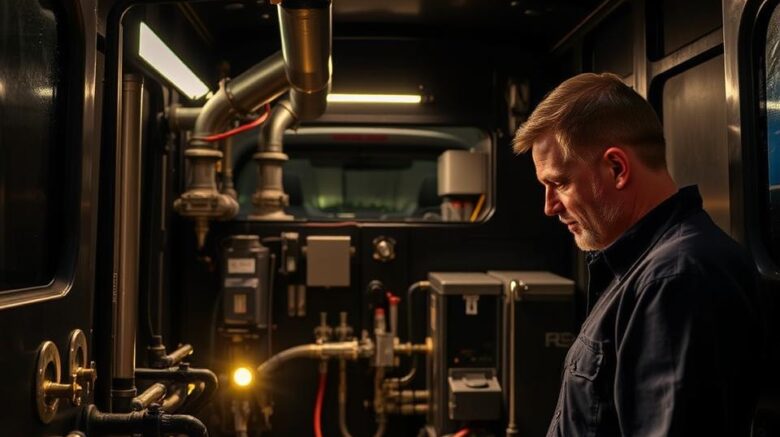Mobile Trailer Septic Tank Pumping – Must-Read Guide
Ignoring a trailer septic system can swiftly become an wallet-draining mistake. If you roam with an RV or mobile rig, it’s crucial to grasp the value of trailer septic Tank Pumping. It ensures your journeys are hassle-free and living conditions stay sanitary during every trip. By prioritizing regular mobile RV tank pumping, this guide strives to make you ahead of the game in looking after your septic system, preventing potential problems – especially when embracing the great outdoors.
In this article, thorough instruction into picking reliable mobile septic services awaits you. Additionally, we cover how to detect when your septic Tank calls for immediate attention. Grasping the process for efficient RV septic Tank Pumping is also covered. Rather than responding to issues as they occur, allow this guide to furnish you with necessary knowledge. This sets up your RV experiences keep free of concern!
The Value of Routine Trailer Septic Tank Pumping
Consistent servicing of your camper’s septic Tank is essential for its wastewater system’s functionality. Putting off this can lead to clogs and backups, dampening your enjoyment and impacting the environment. Sewage leaks from an over-filled Tank can pollute the area, posing major problems.
Teaming up with professional Pumping services like All in Sanitation is prudent for trailer owners. This action avoids issues and boosts your system’s functionality and longevity. On-schedule Pump-outs create a cleaner, safer environment in RV parks and campgrounds.
Understanding Your Trailer’s Septic System
A motorhome septic system includes three primary elements: the black water Tank, grey water Tank, and fresh water Tank. For RV owners, it’s vital to know these parts. They are fundamental in waste management. The black water Tank contains toilet sewage, whereas the grey water Tank holds water from sinks and showers.
Each Tank has a specific role in maintaining the rig clean and operational. Keeping an eye on the levels in the black water and grey water Tanks is important. It staves off overflows, bad smells, and damage to the septic system.
For a clearer understanding, below is a table that lays out differences between the black water and grey water Tanks:
| Feature | Black Water Tank | Grey Water Tank |
|---|---|---|
| Purpose | Keeps sewage waste | Collects wastewater from sinks and showers |
| Maintenance Frequency | Requires frequent Pumping | Needs infrequent emptying |
| Potential Issues | Odors, blockages from solids | Risk of grease buildup |
| Typical Size | Generally bigger than grey water Tank | Smaller than black water Tank typically |
Knowing your trailer’s septic system is cornerstone for maintenance. It guarantees hassle-free travel experiences. Staying mindful of both Tanks translates to trips with no septic concerns.

Indicators Your Septic Tank Needs Pumping
It’s critical to know when your septic Tank needs Pumping to protect your system efficient. Detecting issues early can prevent major repairs and environmental harm. Primary signs that need attention include:
- Slow draining sinks, which may indicate a full Tank or clog.
- Gurgling toilets, signaling blocked pipes or a failing septic system.
- Foul odors around your camper, an early warning of rising sewage.
- Pooling water near the drain field, revealing that your Tank may be overwhelmed.
- Sewage backups in your toilets or drains, a definite sign urgent action is needed.
Becoming aware of these signs empowers RV owners to act swiftly, heading off grave issues. Keeping tabs on your system and responding to these indicators can prolong your septic system’s lifespan. This approach ensures a better RV experience.
Variables Impacting Pumping Frequency
A septic Tank’s capacity significantly dictates how often it demands Pumping. Larger Tanks need fewer service because they contain more waste, in contrast smaller Tanks demand more regular Pumping.
The fleet size using the septic system also impacts Pumping frequency. With more RVs, the system experiences increased strain, necessitating accelerated Pumping. Particularly in peak seasons, adjusting the schedule is important to avoid problems.
Here is a table that highlights recommended Pumping intervals based on typical scenarios:
| Septic Tank Size | Number of RVs | Recommended Pumping Frequency |
|---|---|---|
| 500 gallons | 1-2 RVs | Roughly every 2-3 years |
| 1000 gallons | 2-4 RVs | Around every 3-5 years |
| 1500 gallons | 4+ RVs | As often as 1-2 years |
Properly setting your septic Tank’s Pumping frequency improves its operation. It also increases its life and performance. This selection is key for maintaining system health.
Selecting a Trustworthy Septic Pumping Service
Choosing a solid septic Pumping service is vital for your RV’s septic system health. It ensures swift and efficient Pumping, preventing pricey future repairs. When searching for a septic service provider, pay attention to these critical aspects:
- Experience: Look for companies with a long track record. Their familiarity with various septic systems, especially those for trailers, is paramount.
- Customer Reviews: Read online reviews and testimonials. Glowing feedback and high ratings are signs of a dependable provider.
- Response Time: Rapid response times reflect a company’s dedication to their customers and ability to meet their needs efficiently.
- Knowledge of Systems: Deep knowledge of trailer septic systems sets apart some services. Providers like All in Sanitation grasp these systems well, enabling bespoke service.
Focus on these considerations to get the most fitting service for your septic requirements. A dependable septic Pumping service extends your system’s life and performance, allowing for carefree travel adventures.
RV Septic Tank Pumping: How It Works
Trailer septic Tank Pumping involves critical steps for efficiency and safety. It’s vital for RV owners to grasp this process before service appointments.
A technician with a trailer-mounted Pump comes first, suited for mobile systems. This technology facilitates effective waste removal while protecting the environment. They attach the Pump to the rig’s system with a hose reaching the Tank.
The Pump then extracts the waste out of the Tank. This action is vital to keep the septic system healthy and prevent overflow. After emptying, the technician examines the Tank for damage or wear, confirming proper function.
Following the Pump-out, waste disposal is paramount. The hauled waste is transported to treatment facilities for safe processing. This step reduces environmental harm.
The process gains from the trailer-mounted Pump’s power. Regular service saves time and cost, maintaining the septic system in prime condition.
Urgent Septic Pumping Services
Unexpected issues with your septic system can require immediate intervention. For RV enthusiasts, recognizing when to call for emergency septic Pumping is vital to avoid further damage and exorbitant costs. Scenarios calling for prompt septic Tank Pumping include backups, unpleasant smells, and sewage leaks. Rapidly tackling these issues often requires septic Tank Pump and haul services to efficiently get rid of waste and regain system functionality.
Providers like All in Sanitation provide 24/7 emergency septic Pumping, making sure help is readily available in a pinch. Acting fast with these services significantly improves your septic system’s lifespan and performance. Having a trusted septic service on speed dial can lower expenses and stress in emergencies, delivering uninterrupted enjoyment of RV adventures.
Best Practices for Caring for Your RV Septic System
Keeping your trailer’s septic system in peak shape is crucial. Smart maintenance strategies can prevent expensive problems later. First, do regular checks for damage, leaks, or strange smells for RV septic Tank care.
Sensible waste disposal is central for a healthy system. Do not flush items that won’t break down, and choose septic-friendly products. It’s important that everyone understands how their actions influence the septic system. This makes certain it stays functional and efficient.
- Conduct regular checks for leaks and unusual odors.
- Communicate regularly with your septic service provider for on-schedule maintenance.
- Utilize septic-safe toilet paper and cleaning supplies.
- Stop pouring chemicals down the drain that could harm the balance of bacteria in the Tank.
- Schedule for regular professional inspections to spot potential issues early.
Following these steps assists RV owners prolong their trailer septic systems’ life and performance.
Typical Problems with RV Septic Systems
Mobile septic systems often deal with issues that plague RV owners. Address these issues early to sidestep bigger problems later. Clogs in septic Tanks are typical, mainly due to not disposing of waste properly. To avoid clogs, choose RV-safe toilet paper and conduct regular maintenance.
Another major issue is odor control. Bad smells can signal backups or leaks, requiring immediate action. To minimize odors, ensure the system is properly vented and the septic Tank is emptied as needed.
Leaks can appear from wear or incorrect installations. Fast identification of leaks assists in preventing environmental damage and preserves the system working. Periodic inspections are important to catch these issues early.
To get ahead of common issues, follow preventative strategies like regular care and proper waste disposal. Knowledgeable and proactive RV owners can savor their travels care-free and with peace of mind.
In Closing
Mastering trailer septic Tank Pumping is key for RV and trailer owners. Routine maintenance and spotting trouble signs in your septic system can enhance your RVing experience significantly. Managing your RV’s septic system well secures both safety and comfort during your outdoor adventures.
Choosing a reliable service for your trailer’s septic Tank Pumping is critical. Engaging experts like All-In Sanitation ensures your mobile waste management is first-rate. This approach is not just green, but it also enhances the camping experience, making it more enjoyable and sustainable.
Actively maintaining your septic system minimizes emergencies, improving your nature stays. Adequate care and understanding allow memorable trips for the best reasons.
